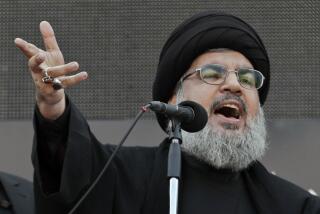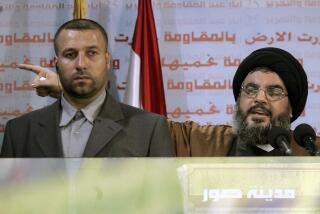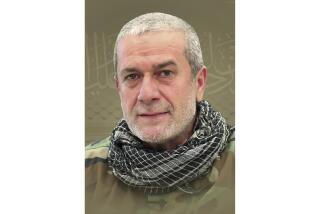Israel and Hezbollah Leaders Trade Warnings
- Share via
JERUSALEM — Israel and militant Shiite leaders in Lebanon traded warnings Saturday in the wake of the abduction of a Muslim clergyman whom Israel evidently plans to use in an attempt to win freedom for Israeli soldiers held captive in Lebanon.
In Beirut, clerical leaders of the pro-Iranian group Hezbollah said that the abduction by Israeli commandos Friday of Sheik Abdel Kareem Obeid from a village in southern Lebanon justifies retaliation against Jewish religious figures.
“By attacking a clergyman, Israel has violated the immunity of Muslim sanctities. This will prompt Muslims to strike at Jewish religious leaders in the future,” warned Abbas Moussavi, a Muslim preacher and leader of Hezbollah (Party of God).
Israeli officials, in response to alarm abroad that foreign hostages may suffer if Hezbollah strikes back, cautioned the group not to avenge the kidnaping. “In an organization like Hezbollah, its leaders have great importance to the organization, and it is reasonable to think that the organization as such will think twice about harming prisoners,” said army spokesman Col. Ranaan Gissin.
Israeli commandoes seized Obeid and two associates as a step to win the release of its own soldiers believed held by Hezbollah, government radio said Saturday. At least two Israeli soldiers are said to be under Hezbollah control; a third may also be in its hands. No mention was made of a U.S. Marine, Lt. Col. William R. Higgins, abducted by Hezbollah last year. But Israeli sources said that should talks get under way for a prisoner swap, he could be part of the bargain.
Initial responses from Hezbollah on a possible exchange were negative. “A swap is not acceptable at all,” Moussavi told reporters in Lebanon.
Prisoner exchanges between Israel and its Arab enemies have taken place before; in 1985, Israel freed 1,200 Palestinian prisoners in exchange for three soldiers held by Palestinian captors in a part of Lebanon controlled by Syria. Israel holds scores of Lebanese prisoners within the bounds of a self-declared security buffer zone in south Lebanon.
Reports vary on the fate of Higgins. Abductors released a photo of him late last year showing him alive, although his death has since been rumored. He disappeared in February, 1988, after paying a visit to leaders of Amal, a militia that competes with Hezbollah for dominance in southern Lebanon.
The seizure of Obeid highlighted public differences between Israel and the United States over the wisdom of such direct action. President Bush took the view Friday that kidnapings contribute to the cycle of violence in the Mideast.
Israel, on the other hand, made the point that its strategy brings results and responds to the desire of common citizens to do something to thwart terrorism and the taking of hostages.
“There may be some people who voice disapproval, but public opinion understands that this act was taken against one of the leaders of one of the most fanatical groups in Lebanon,” commented Avi Pazner, spokesman for Prime Minister Yitzhak Shamir.
In Paris on Saturday, U.N. Secretary General Javier Perez de Cuellar condemned the kidnaping and asked that the captives be returned to Lebanon. Egypt, the only Arab country officially at peace with Israel, denounced the action as an act of “terrorism.”
More to Read
Sign up for Essential California
The most important California stories and recommendations in your inbox every morning.
You may occasionally receive promotional content from the Los Angeles Times.













